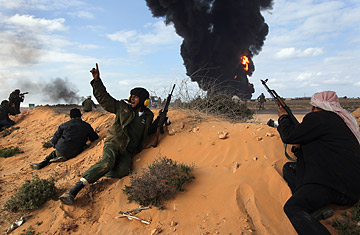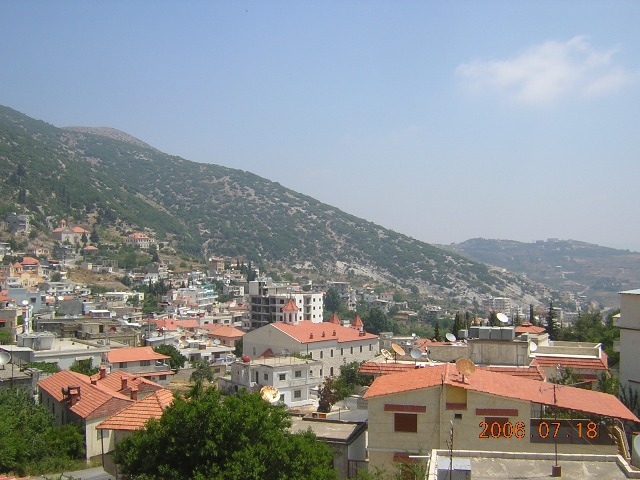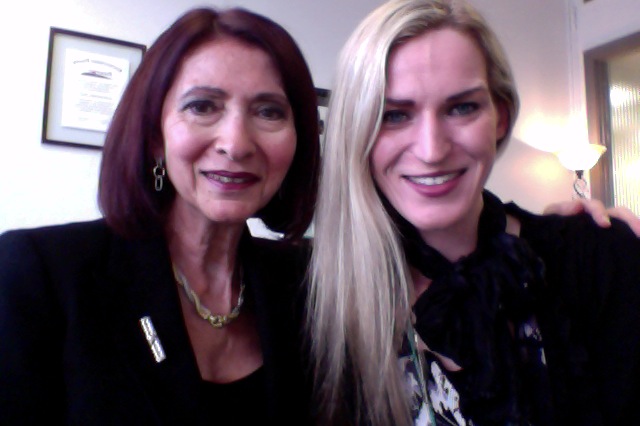Libya is heating up again after some time out of the news, with an attempted coup d’etat against the government by Khalifa Haftar, an ex-general and a leading commander of rebel forces during the Libyan Civil War. Libya has basically fallen apart since Muammar Gadhafi was overthrown in 2011 with NATO’s support: there is no functioning national army, no constitution, and most cities are under the control of militias of one sort or another. Some of these militias are tribal or linked to particular neighbourhoods, others are Islamists, and still others are essentially criminal gangs. Weapons, from rifles to machine guns and rocket launchers, are everywhere, with huge amounts of military equipment spilling over into neighbouring countries.
Libya’s problems are rooted in a lack of a strong national identity, as well as the total lack of government organization during and since the fall of Gadhafi. Libya’s problems are important for two reasons. First, European states such as Italy and France rely on Libyan oil exports. Second, if Libya collapses, it could cause large numbers of people to flee as refugees, even more weapons to flow out of the country, and could become a haven for terrorist groups. For that reason, NATO, which bears some responsibility for what is happening there, should be supportive.

Idris was pro-Western in his foreign policy and ruled with a strong hand, supported by huge revenues from newly-discovered oil reserves. This was unpopular among many military officers, who were inspired by rising Arab nationalism. Many of these officers came from Tripolitania and felt excluded by the king, who was from the east. In 1969, while in Italy for surgery, Idris was overthrown in a military coup led by a young lieutenant named Muammar Gadhafi. Gadhafi was part of a group of military officers called the Revolutionary Command Council, but by 1973 he had sidelined them. The new Libya was initially modeled after Egypt, with the government ‘nationalizing’ or taking control of much of the economy, expanding social services like healthcare and education, crushing all political opposition and (mostly) aligning with the Soviet Union.
In 1977, Gadhafi declared the country a Jamahiriya, roughly meaning “peoples’ republic” in Arabic, while Gadhafi became the “Brotherly Leader” of the revolution. While the new constitution introduced an unusual form of direct democracy, in practice Gadhafi was the supreme ruler of Libya in all respects. The government controlled every organization in the country, from professional associations and unions to businesses to the media. The security forces were divided into many factions, with each organization competing for resources. This made Libya’s military largely ineffective, but prevented coup attempts by making every group too weak to do anything against Gadhafi. Domestic opposition was crushed without mercy. Most opposition came from exiles, including former Gadhafi supporters; these people faced the constant risk of assassination by Libyan agents for their activism. During the 1990s, Gadhafi faced growing resistance from Islamists, many of who had fought in Afghanistan against the Soviets. These forces were defeated, although Gadhafi increasingly embraced Islamist rhetoric in his rule.

At the beginning of the decade, most outsiders considered Libya stable, just like the rest of the Middle East’s authoritarian states. Yet, on 18 December 2010, a young street vendor named Mohamed Bouazizi burned to death after setting himself on fire in protest against the Tunisian government. Within three weeks, the longstanding Tunisian president had fled into exile and protests had spread throughout the region, beginning what would be called the ‘Arab Spring.’ When protests broke out in Benghazi, the largest city in Cyrenaica, on 15 February 2011, Gadhafi vowed to crush them. How very wrong he was.




